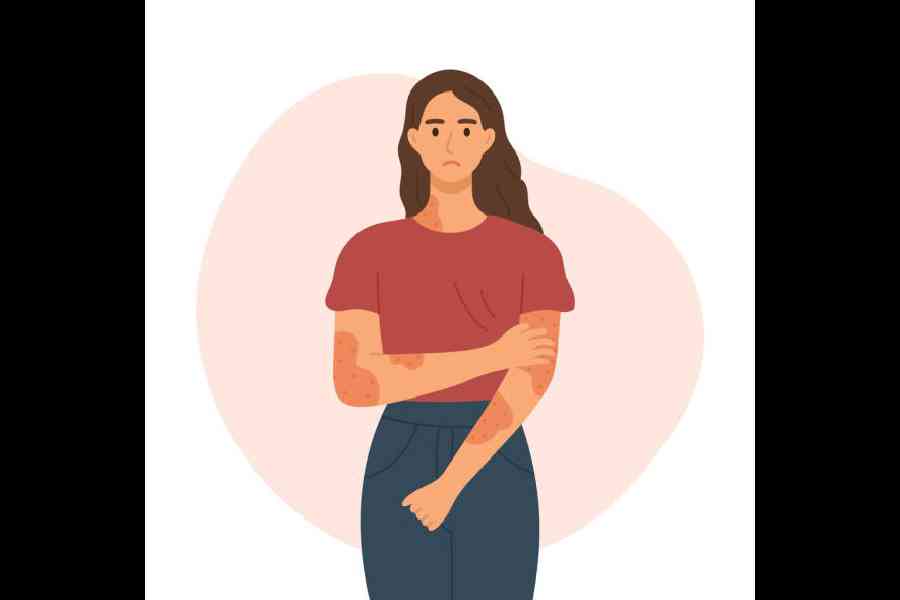Psoariasis is a mysterious skin disease that appears in many guises. It affects around 5 per cent of the population, who develop disfiguring, scaly, itchy eruptions all over their skin. It can occur on the elbows and knees, in flexures and folds or the face and scalp. About 10 per cent of patients may develop joint pain as well — arthritis — which makes mobility difficult. The nails may be affected, becoming yellow and disfigured.
In a society acutely conscious of appearances, these blemishes detract from friendships and undermine the personality of the individual. Those suffering from psoariasis often become diffident and withdrawn. Employment becomes difficult. To make matters worse, the uninformed confuse psoariasis with leprosy, an entirely unrelated, infectious disease.
Psoariasis occurs because there is an imbalance between the rate of formation and the rate of shedding of skin in certain areas of the body. Normally, new skin cells form in the lowermost layer of the skin and gradually rise upwards. Eventually, the topmost layer falls off and the layer of newer cells below it rise to the top. In most people this takes about a month, a uniform asymptomatic process that passes unnoticed. The entire process is accelerated and uncoordinated and takes only a few days in psoarisis. The skin then piles up, producing a thickened, silvery appearance.
The disease appears between the ages of 16 and 25 years or after the age of 55. It may be precipitated by environmental factors such as a bacterial (streptococcal) infection, exposure to medications like anti-malarials, some anti-hypertensives, painkillers like indomethacin, or anti-depressants like lithium. It may appear with prolonged exposure to certain chemicals like disinfectants and paint thinners. It can also be aggravated by stress and alcoholism. There may also be a genetic predisposition.
The diagnosis of psoariasis is usually made from the typical appearance of skin lesions. A scraping or biopsy may be needed if the appearance or history are not typical. The skin lesions tend to wax and wane, sometimes improving on their own or mysteriously disappearing all together. This makes evaluation of any treatment regimen difficult.
Also, unlike in the case of other chronic illnesses, there is no standard treatment regimen. There are guidelines, but treatment has to be individualised. In mild cases, simple home remedies may be sufficient. Adding coconut oil to the bath water and avoiding harsh soaps and detergents is helpful. At night, a topical application of a moisturising emollient like paraffin wax, petroleum jelly or baby oil may be sufficient. The hair on the scalp has to be parted, and the oil must be applied with a brush.
Sometimes, the scales (particularly on the scalp) can be quite thick. Regular use of a salicylic acid shampoo, alternating with a coal tar shampoo, can be effective. If these simple measures do not work, a dermatologist can provide stronger topical applications. However, these ointments may have side effects and should be used only under medical supervision.
Steroid topical creams can cause the lesions to disappear rapidly.
The creams have to be chosen carefully, as they cause side effects. Light therapy too is quite effective with either exposure to sunlight or to artificial light from ultra violet lamps.
Medications that can be ingested are methotrexate and some newer retinoids. However, retinoid pills can cause gene mutations. Women who have taken retinoids should not become pregnant during treatment and for at least two years after.
Psoariasis follows a frustrating remitting relapsing course over a lifetime.
The writer has a family practice at Vellore and is the author of Staying Healthy in Modern India. If you have any questions on health issues please write to yourhealthgm@yahoo.co.in










